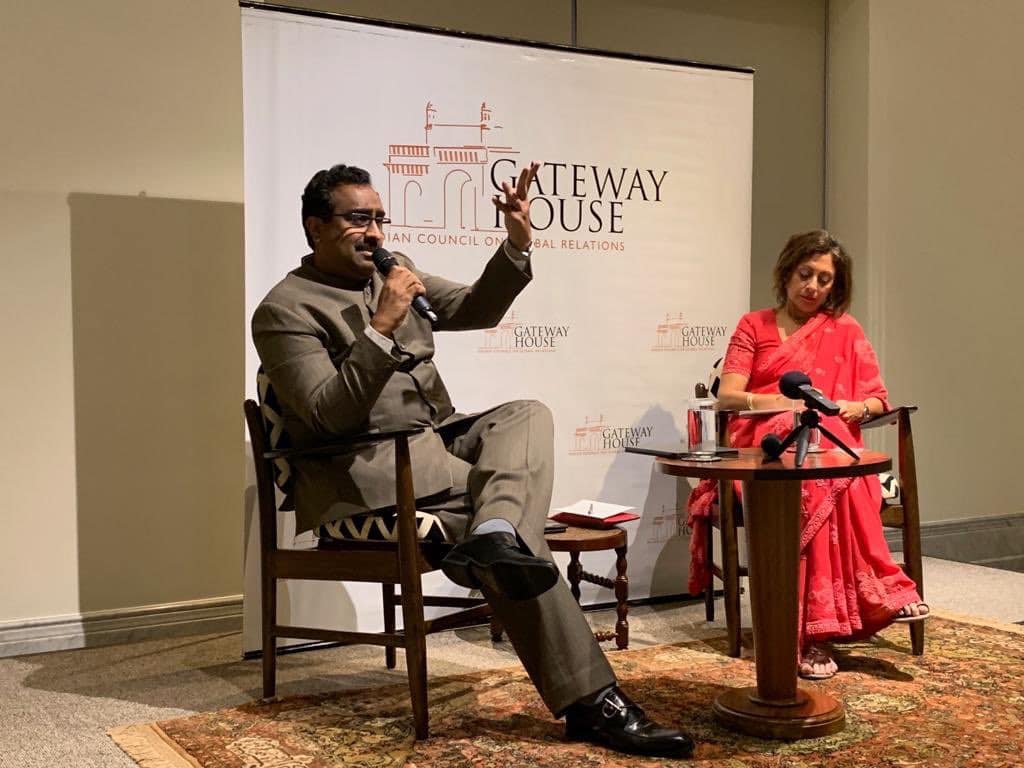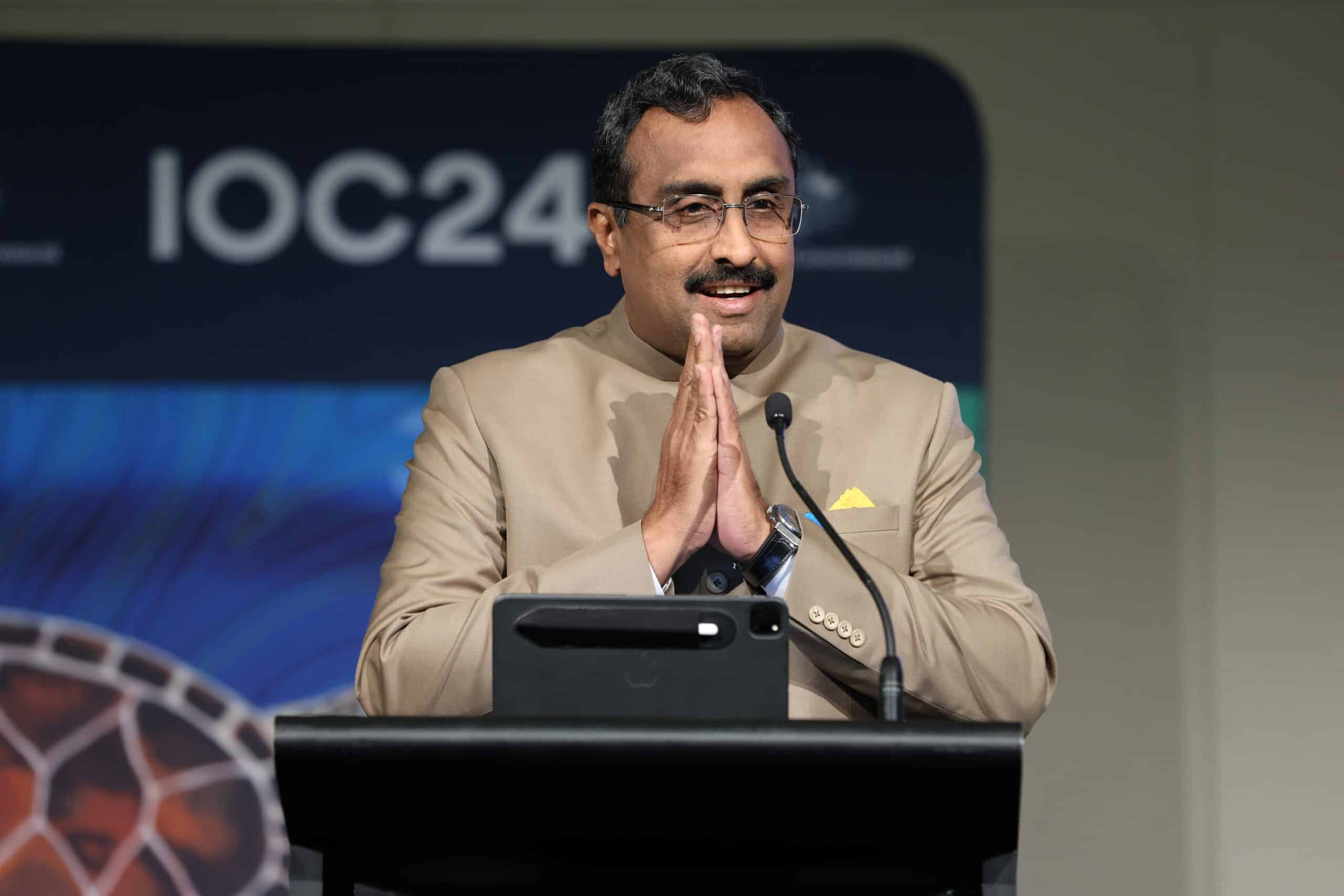
|
Getting your Trinity Audio player ready...
|
Text of Shri Ram Madhav’s Address at an interaction organised by Gateway House in Mumbai on August 13, 2019
Friends Namaskar to all of you,
I want to start by saying ‘We are back’. We came back with a big majority, and we are back in power to run the country for the next five years. There are many reasons for the mandate that people gave us but I will highlight two important ones. Firstly, people wanted a stable and strong government at the Centre. That is the reason why they gave us a very comfortable majority. I do not hesitate to admit before this enlightened audience that it was beyond our own expectations and assessment also. Secondly, people also wanted a decisive and strong leadership. They found that in Prime Minister Modi.
Modi 2.0
Many people wanted to know what would Modi 2.0 look like?
It is two things. At one level, it will be a continuum. We have initiated many major reforms, started many important initiatives in the last five years. We have to take them forward. That will remain as one of the priorities. But then, the new government has come with new expectations from the people as also with new challenges, domestic as well as international.
As far as the domestic challenges are concerned, honestly speaking, I am not trying to boast about our strength or anything, but we really do not see any major political challenge before us. Probably it will take many years before such a challenge arises. We are very comfortably placed as far as domestic political challenges are concerned. We are ready to tackle any challenge politically.
More and more people are attracted to the BJP and Prime Minister Modi’s policies. As far as domestic politics is concerned, it appears as though the next five years will not be as challenging as the last five years have been. But then we have challenges in the form of slowing down of the economy. That will be one of the top-most priority areas for us. We attempted many significant reforms in the last five years. I do not have to elaborate on them again. You know about GST; you know about IBC and many other such reforms like recapitalisation of the nationalised banks etc.
Yet the challenge of the slowing down of our economy remains one of the top-most challenges for our economy. So, we will be taking a number of proactive measures in the coming months to address that challenge.
You all know that we have very ambitious goals for our economy. We talked about reaching $5 trillion in the next five to seven years’ time and it is not a small challenge for us. We are also conscious about the immediate challenges like job creation, boosting domestic investments and several other things. We will certainly be focusing on these areas.
Internationally, there are certain immediate neighbourhood challenges. India’s stature and prestige in the world has gone up in the last five years. Hence we do not foresee any major complications in terms of dealing with challenges in the immediate neighbourhood. India in the last five years under Prime Minister Modi, has also demonstrated an eagerness to play a more proactive role in global affairs.
I would urge you to read the joint statement of Prime Minister Modi and President Obama in 2014. Prime Minister Modi was in USA for his maiden UN address. The joint statement had one important sentence that talked about India’s ambition to play a proactive role in world politics. Probably for the first time, an Indian leadership had publicly articulated this ambition to rise as an ‘influential and responsible global power’. This was the exact phrase used – ‘influential and responsible global power.’ I’m sure all of you would acknowledge that in the last four years, subsequent to the statement, the government and Prime minister Modi have taken a number of steps and initiatives in this direction.
Today we have the first headquarters of an international organisation in Delhi – the International Solar Alliance. But that is just minor. The larger point is that we wanted to play a proactive role in the welfare and well-being of the entire world. So, towards that end, we will be taking a number of steps. Prime Minister is again going to the UN this September after a gap of about three years. He will be articulating the new vision of the Government of India’s foreign policy there.
We have also, in the last more than two decades, actively turned our attention to the East. Prime Minister Narasimha Rao was the leader who had initiated the Look East policy in early 1990s. Subsequently under Vajpayee, it was renamed as the Act East policy. Prime Minister Modi’s government attaches a lot of importance to our relations to the East of our country as a part of our Act East diplomacy.
We have strong bilateral relations with the ASEAN group of nations. We have even joined the Shanghai Cooperation Organization as a member. We used to have SAARC; it has now been upgraded to BIMSTEC. Of late, we are paying more attention to our interests in the Indian Ocean Region.
Thus, there will be a lot of activity to the east of our country. It is already going on but in the coming years you will see a lot more, the important reason being that the global power axis has today moved closer to the Indo-Pacific region. It is here that the economies of scale exist today; it is here that the markets are there; it’s here that the populations with good purchasing power exist; it is here that the consumption is there; it is here that massive energy needs are there. It is the most happening region today. It is the most happening region in the world. So, we realise that we have to turn our attention in a big way to our eastern neighbourhood. Negotiations are going on – on whether India should join RCEP; if yes, then under what considerations and conditions?
The Prime Minister has tried very hard to maintain good relations with all the neighbouring countries. We have traditional problems with one neighbour, but then excluding that one neighbour, we today enjoy fairly good relations with almost all the other neighbours. As far as China is concerned, after the experience at Doklam, the two countries have made conscious efforts to strengthen bilateral understanding.
One very good thing about India-China relations today is that the two leaders – President Xi Jinping and Prime Minister Modi – enjoy very good personal rapport and understanding which is a very important factor in the relationship between the two countries. The understanding between the leaders goes a long way in managing the affairs of the two countries smoothly.
The kind of summit that we have had last year, the Wuhan summit, was unheard of. The two leaders met without any agenda, just to have a free discussion of everything under the sun, understand each other’s position and each other’s concerns. It was a major breakthrough in our relations. Later this year we will see Wuhan 2 happening in India. We are hoping that President Xi Jinping will come to India and we will again see a similar informal get together between the two leaders for a couple of days in one of the Indian cities.
Our effort will be to ensure that we will have peace and stability in the neighbourhood. Greater focus will be towards securing our interests in the East and strengthening our relationships in our Indian Ocean. India’s interests are better served by looking at the Indian Ocean Region.
While managing the relations in the neighbourhood and also in the larger world, sometimes domestic challenges also arise, like the recent Kashmir developments. These were being projected as an international concern, and our neighbour Pakistan is trying to take it to the international forum. Government is conscious of it. We knew before we took the decision that there would be efforts to make Kashmir an international issue for somebody else to come and negotiate and all that.
India is no longer a pushover today. It has a stature and respect in the world. Whatever we have done in Kashmir is strictly an internal matter. It is fully within the framework of the Indian constitution. No second country will have any right to talk about what we do within the framework of our own constitution. We will try and explain this to the countries and leaders abroad. We really do not see any major problem in that.
This is broadly the vision and direction of Modi 2.0. On the domestic front is economy and development. We have set certain ambitious developmental goals which will be our main priority besides aligning with states for other goals on the domestic front. We have decided to build about 50 million houses for the poor families in India by 2022. It also serves as an infrastructure opportunity for many companies and people. Similarly, we have to address joblessness. Job creation challenge will be taken up in a big way.
The country will certainly be witnessing many more good things happening. Things that will also enhance India’s prestige and honour globally.
Thank you.



